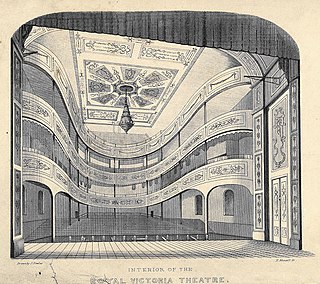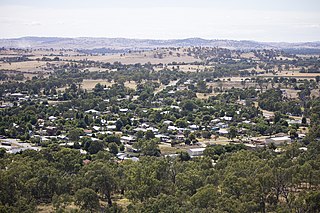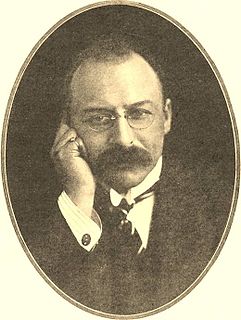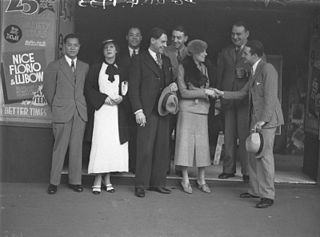Return to Sydney
Securing a position as sub-editor with the Sydney Morning Herald, Irvin returned to Sydney with his family in 1962. He retired from the Herald in 1973. [2] [5]
In 1968 came his second volume of poetry, A suit for everyman. However, his main output was as a historian of the Australian theatre focussing on the lives of actors, the production mechanics and architecture of the theatres published in numerous articles in scholarly Australian, English and American journals and his books: in 1971, a history of Georgian theatre in Australia, Theatre comes to Australia; a biography of actor George Darrell (1841–1921), Gentleman George, king of melodrama in 1980; Australian melodrama in 1981; and in 1985 the Dictionary of the Australian Theatre 1788–1914 (1984). In 1979 he edited with an historical introduction, Walter Cooper's play Colonial experience which was first performed at the Royal Victoria Theatre, Sydney, in 1868. [2] [5] [6]
George Frederick Price Darrell (1851–1921) was an Australian playwright best known for The Sunny South (1883).

The Royal Victoria Theatre was a theatre in Sydney, Australia, the first large theatre in the city. It opened in 1838; operas, plays, pantomimes and other events were held, and leading entertainers performed at the theatre. It was destroyed by fire in 1880.
He also produced Sydney as it might have been : dreams that died on the drawing-board in 1974. Drawing largely from the back issues of The Sydney Morning Herald and its sister publications, he described the architecture of Sydney which had been imagined but not built, as he wrote, because the dreams were "defeated again and again by lack of money, political in-fighting, some power struggle or other, or the fluxion of time". [7]

Wagga Wagga is a major regional city in the Riverina region of New South Wales, Australia. Straddling the Murrumbidgee River, with an urban population of more than 54,000 as at the 2016 census, Wagga Wagga is the state's largest inland city, and is an important agricultural, military, and transport hub of Australia. The ninth fastest growing inland city in Australia, Wagga Wagga is located midway between the two largest cities in Australia–Sydney and Melbourne–and is the major regional centre for the Riverina and South West Slopes regions.

Gundagai is a town in New South Wales, Australia. Although a small town, Gundagai is a popular topic for writers and has become a representative icon of a typical Australian country town. Located along the Murrumbidgee River and Muniong, Honeysuckle, Kimo, Mooney Mooney, Murrumbidgee and Tumut mountain ranges, Gundagai is 390 kilometres (240 mi) south-west of Sydney. Until 2016, Gundagai was the administrative centre of Gundagai Shire local government area. In the 2016 census the population of Gundagai was 1,925.
Robert William Geoffrey Gray is an Australian poet, freelance writer, and critic. He has been described as 'an Imagist without a rival in the English-speaking world' and 'one of the contemporary masters of poetry in English'.
David Rowbotham was an Australian poet and journalist.

John Ernest Tranter is an Australian poet, publisher and editor. He has published more than twenty books of poetry; devising, with Jan Garrett, the long running ABC radio program Books and Writing; and founding in 1997 the internet quarterly literary magazine Jacket which he published and edited until 2010, when he gave it to the University of Pennsylvania.

Cinesound Productions Pty Ltd was an Australian feature film production company, established in June 1931, Cinesound developed out of a group of companies centred on Greater Union Theatres, that covered all facets of the film process, from production, to distribution and exhibition.

The Hampden Bridge was a heritage-listed wooden Allan Truss bridge over the Murrumbidgee River in Wagga Wagga, in New South Wales, Australia. It was officially opened to traffic on 11 November 1895 and named in honour of the NSW Governor Sir Henry Robert Brand, 2nd Viscount Hampden. The bridge carried the Olympic Highway, formerly the Olympic Way, between 1963 until the bridge's closure to highway traffic in October 1995, replaced by the Wiradjuri Bridge. The Hampden Bridge was subsequently converted to local traffic use, then pedestrian use only, and finally demolished in 2014.
Antigone Kefala is a contemporary Australian poet and prose-writer of Greek-Romanian heritage. She has been a member of the Literature Board of the Australia Council and is acknowledged as being an important voice in capturing the migrant experience in contemporary Australia. In 2017, Kefala was awarded the State Library of Queensland Poetry Collection Judith Wright Calanthe Award at the Queensland Literary Awards for her collection of poems entitled Fragments.

North Wagga Wagga is an inner northern suburb of Wagga Wagga, New South Wales, Australia, located on the floodplain of the Murrumbidgee River, directly across from the city's Central Business District. North Wagga is one of Wagga's oldest suburbs, being settled at approximately the same time as Wagga. Two pubs are located within North Wagga - The Black Swan Hotel and the Palm and Pawn Hotel, as well as a public school, a public hall, a football/cricket ground and a scattering of business and churches.

Emily Hood Westacott, was an Australian female tennis player in the 1930s.

George Marlow was an Australian theatrical entrepreneur born in London of Jewish extraction, noted for bringing melodrama and pantomime to Sydney audiences in the early 1900s.
The Silence of Dean Maitland is a 1934 Australian film directed by Ken G. Hall, and based on Maxwell Gray's novel of the same name. It was one of the most popular Australian films of the 1930s.
Alfred Rolfe, real name Alfred Roker, was an Australian film director and actor, best known for being the son-in-law of the celebrated actor-manager Alfred Dampier, with whom he appeared frequently on stage, and for his prolific output as a director during Australia's silent era, including Captain Midnight, the Bush King (1911), Captain Starlight, or Gentleman of the Road (1911) and The Hero of the Dardanelles (1915). Only one of his films as director survives today.
Painted Daughters is a 1925 Australian silent film directed F. Stuart-Whyte. Only part of it survives today.
Rex Rienits was an Australian writer of radio, films, plays and TV. He was a journalist before becoming one of the leading radio writers in Australia. He moved to England in 1949 and worked for a number of years there. He later returned to Australia and worked on early local TV drama.

The New Tivoli Theatre, Sydney, previously known as the Adelphi Theatre and the Grand Opera House, was a theatre and music hall at 329, Castlereagh Street, Sydney, Australia, which was long at the heart of the Tivoli circuit.
The Australian Photo-Play Company was a short-lived but highly productive Australian film production company which operated from 1911 to 1912.
Nathon Irvin is a former Australian rules footballer who played with the Sydney Swans in the Australian Football League (AFL).

The Wagga Wagga Express and Murrumbidgee District Advertiser was an English language newspaper published in Wagga Wagga, New South Wales. It was the first newspaper to be published in Wagga Wagga, and was in circulation from 1858-1939.
John Wood was an Australian who acted on the stage and briefly became a film star in Hollywood and Britain in the late 1930s.














